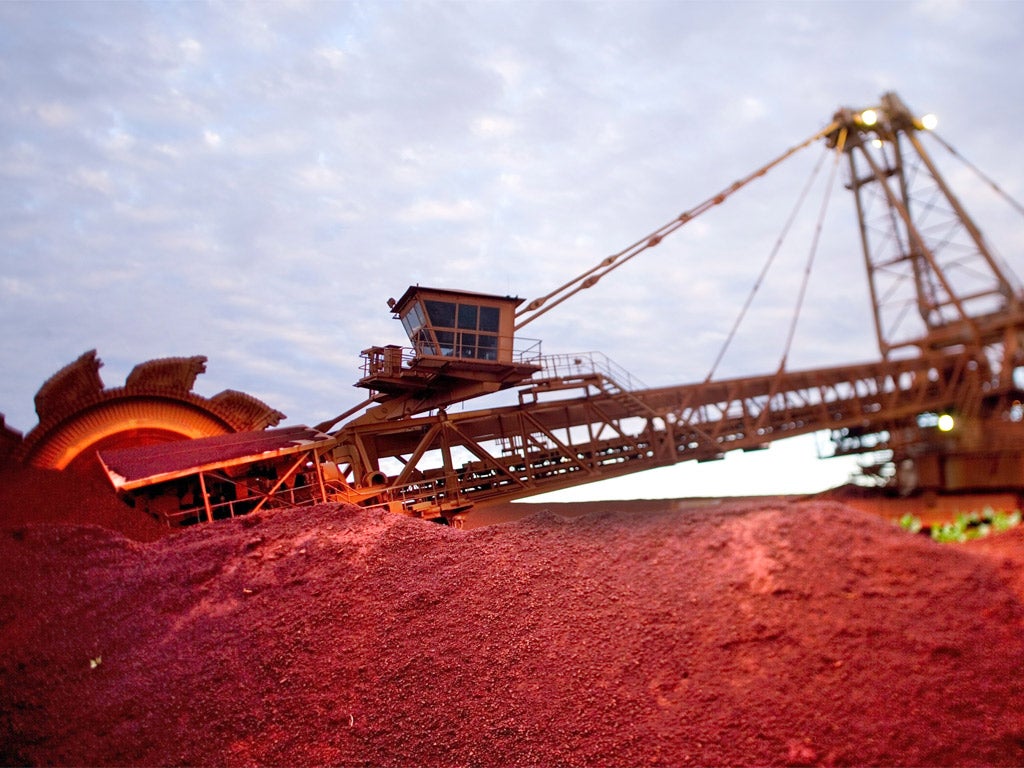Shock and ore Down Under
Australia has avoided recession for 21 years, thanks most recently to a mining boom fed by China. So what happens as Chinese demand falters?

As most of the developed world floundered in the grip of a global slump four years ago, Australia was something of a poster child for growth. The resource-rich nation's mineral wealth kept it out of recession as it fed the ravenous Red Dragon's economic machine with iron ore, copper and coal.
Click HERE to view graphic
The country has not endured a recession for 21 years, and this year it will overtake struggling Spain as the world's 12th biggest economy, despite being outside the top 50 by population. But now China is sneezing, and Australia – and in particular its struggling cohort of mining giants – is in danger of coming down with a heavy cold.
Glencore's protracted dance with Xstrata to create the world's biggest mining business has stolen the recent headlines in the industry, but the on-off marriage comes at an unpropitious time for the sector, when a global collapse in commodity prices is leading the biggest players to shelve investment projects by the giant truckload. Mining – like Australia's once-vaunted cricket team – has been shorn of its brio and swagger.
The industry took another blow this week when Queensland announced plans to hike taxes on coal output from next month, which BHP Billiton warned would dent profits and potentially affect future investment plans. Although miners have been guaranteed no further rises for another 10 years, Rio Tinto said it was "shocked, surprised and very disappointed" by the increase, which was likely to make further developments in Queensland's Galilee Basin less viable in the short term.
The Queensland setback comes just weeks after BHP axed expansion plans for its huge £12bn Olympic Dam mine – a copper, gold and uranium deposit in the South Australian bush. With copper prices down 14 per cent in the past year and governments around the world pausing for breath on nuclear developments after Japan's Fukushima disaster, the investment numbers no longer add up. Instead less profitable mines are shutting and companies are shedding hundreds of jobs.
You don't have to look far for the culprit. China, which accounts for about a quarter of Australia's exports, spooked markets this week with a 2.6 per cent slump in imports during July, adding to signs that the once-breakneck growth of world's second biggest economy is cooling fast. Iron ore prices have been especially hammered, falling by a third in the past two months as China's steel makers drastically cut production. From running a record trade surplus with China, the outlook for the Lucky Country now suddenly looks a lot less certain, a fact reflected in the flagging share prices for a host of Australian miners listed in London.
Jonathan Jackson, at Killik, said: "For the past decade, the mining sector has been a secular play on the industrialisation and urbanisation of China. The sector has been one of the worst performers so far in 2012, falling by 9 per cent in absolute terms."
In late 2009 Australia was the first country in the developed world to begin raising interest rates when other central banks had – and still have – their feet firmly jammed on the monetary policy accelerator. But now the economy is slowing and the central bank is moving borrowing costs in the other direction. The economy grew just 0.6 per cent in the three months to June, decelerating from 1.4 per cent in the previous quarter.
And while business conditions improved in August as firms enjoyed a rebound in sales and profits, business confidence is taking a hit as miners fret about falling commodity prices. National Australia Bank's chief economist, Alan Oster, said: "Mining was the worst-affected industry, with the weakened outlook for commodity prices crunching confidence."
It isn't all gloom for Australia. There are still £175bn in committed projects in the pipeline and spending is not expected to peak until 2013 or even 2014. About two-thirds of these projects by value are in liquefied natural gas (LNG), which is nowhere as dependent on Chinese demand. Much of the LNG still in the ground has already been sold under long-term contracts – some stretching nearly 30 years ahead. But in the short term at least, Australia's economic fortunes look tied to China's faltering advance. And that spells an uncomfortable period ahead for the country and its beleaguered miners.
Subscribe to Independent Premium to bookmark this article
Want to bookmark your favourite articles and stories to read or reference later? Start your Independent Premium subscription today.

Join our commenting forum
Join thought-provoking conversations, follow other Independent readers and see their replies